Voices from the east: Navigating the Atlantic sportscasting desert
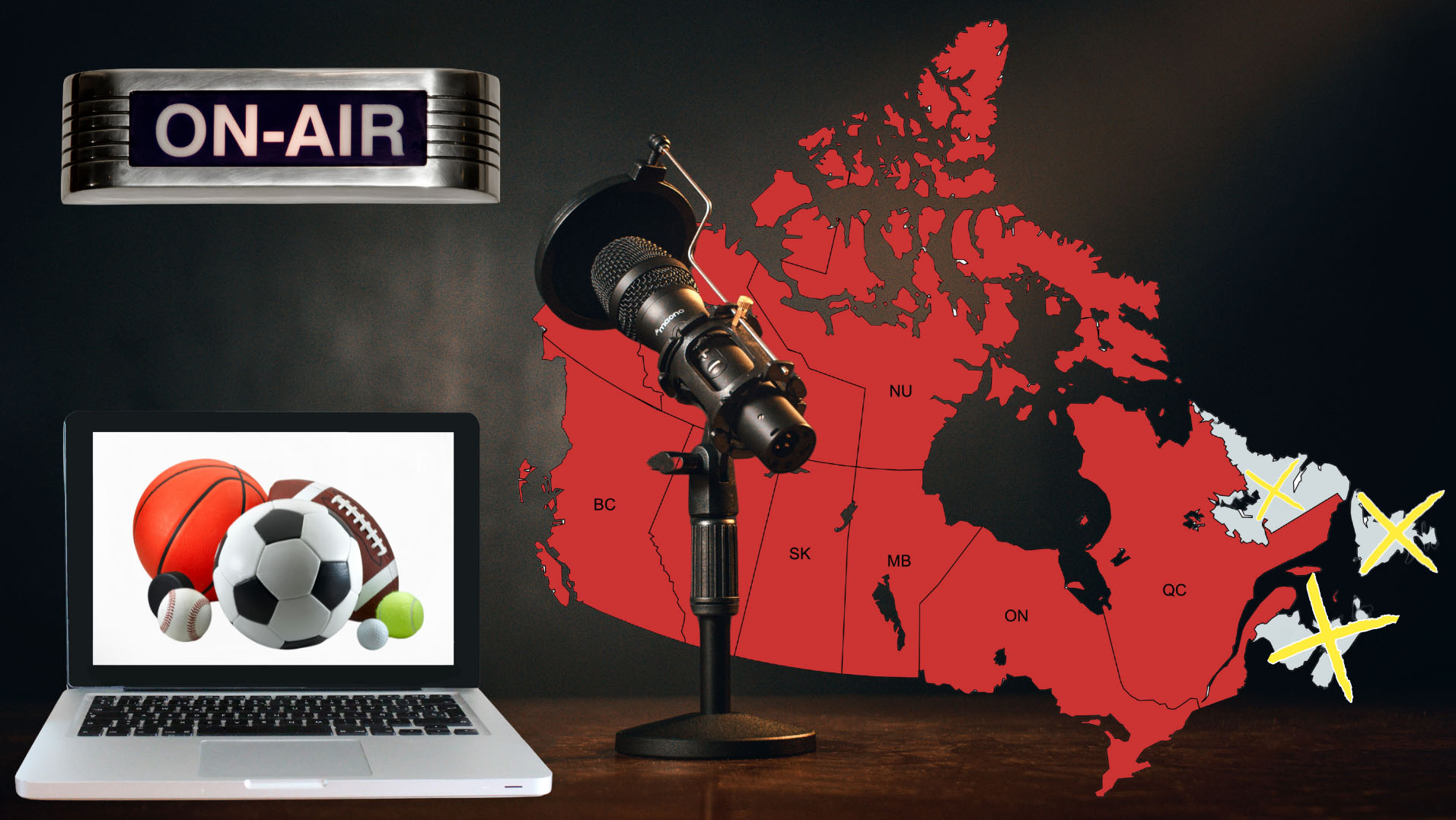
caption
Lack of big leagues, big jobs stymy East Coast sports journalists and aspiring sportscasters
“All the way from the parking lot!” exclaims Vincent Williams as the Mount Royal University Cougars take the lead over the Dalhousie Tigers with a deep three-point shot at the Shoveller Memorial Basketball Tournament in Halifax, early on a Sunday in October.
Williams’ dedication to calling matches has earned him a rare job as a sportscaster in Atlantic Canada, but his professional experience reveals the struggle on the east coast where funding cuts, lack of top-end professional teams, and the rise of social media has led aspiring playcallers to leave the region for full-time employment.
Williams, a freelance play-by-play broadcaster and journalist based in Halifax, is one of the few who stayed in Atlantic Canada. He has worked for 14 years hosting and writing for multiple leagues at both the university and pro level.
He also must balance a second job to make ends meet. He says his attraction to stadium and arena sidelines traces back to his childhood as an athlete.
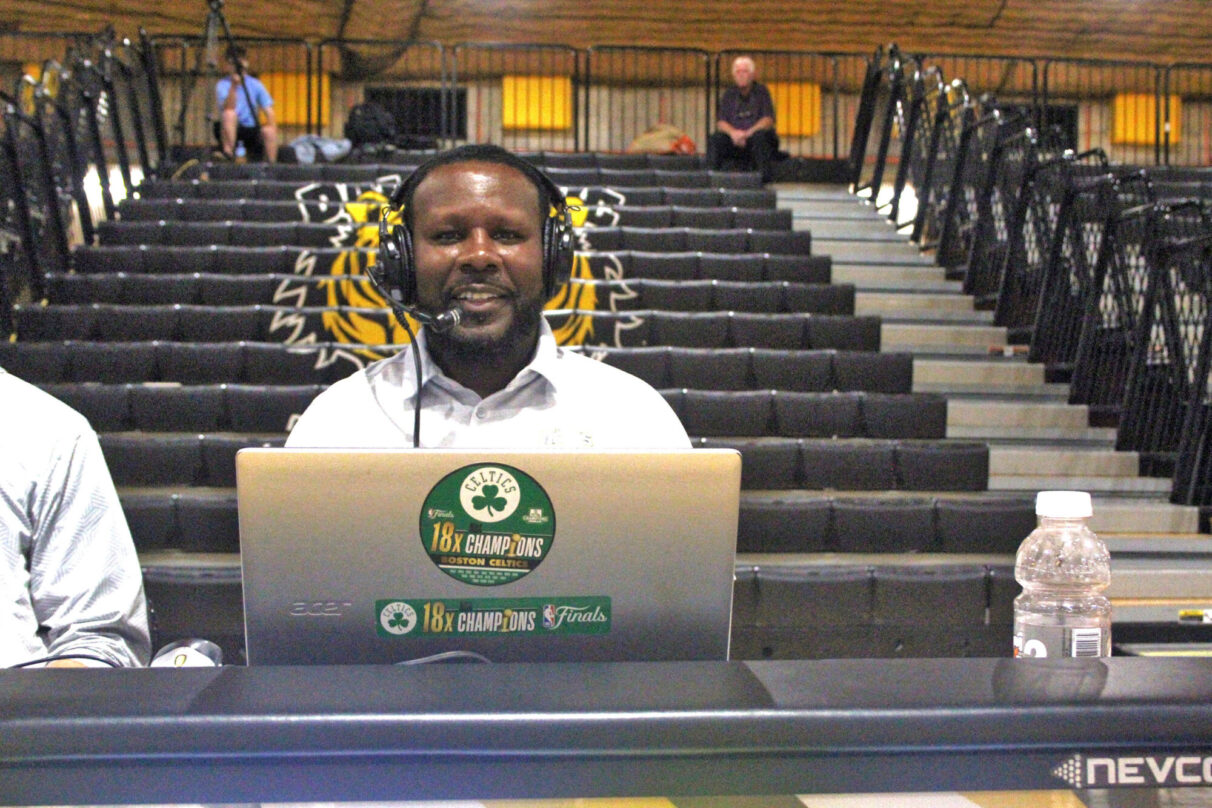
caption
Halifax sportscaster Vince Williams, seen here working a basketball tournament, has to take a second job to make ends meet.“The love of sport and competing in sport, and one day wanting to be a sports broadcaster, listening to all my favourite sports broadcasters and trying to emulate them,” Williams told The Signal from his office, where he is a full-time youth worker.
Over the last 20 years, the Atlantic provinces have seen massive cuts in coverage and jobs for sportscasters. Websites such as Job Bank, Canada’s federal government employment service, only showed six general broadcast jobs across the country and none in the Atlantic provinces as of Oct. 2.
Other employment websites such as Indeed and LinkedIn show more jobs for general broadcasting, however, once again there are zero jobs for sportscasting in Atlantic Canada as of Oct. 2.
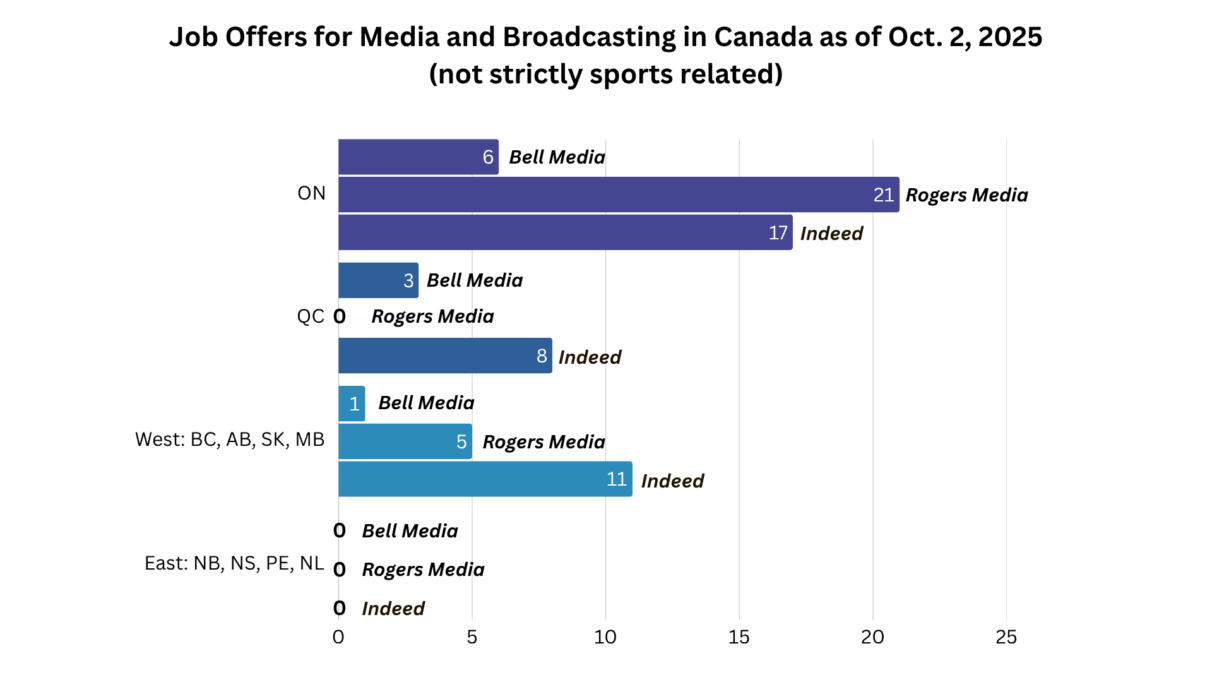
caption
Job listings for broadcasters across different provinces in Canada taken from Bell Media, Rogers and Indeed.Two jobs, two struggles
The inconsistent coverage east of Quebec from large networks like TSN and Sportsnet is a challenge for local sportscasters who want to work close to home. Sportsnet and TSN were contacted by The Signal but did not respond.
“Being a broadcaster here in Atlantic Canada and Halifax in particular, you can’t make a living off of just doing broadcasting and sports broadcasting. You have to have a second job,” Williams said.
He works for the Department of Education and helps African Nova Scotian students navigate high school and transition to post-secondary education.
“So, that’s my day job Monday to Friday. I’m in a high school setting, mentoring and inspiring and advocating for students and their families.”
Funding cuts, lack of a pro market
Williams says there is a major sports vacuum in Atlantic Canada.
Halifax has five pro teams but none at the top level: the HFX Wanderers FC for men’s soccer, the Halifax Thunderbirds for lacrosse, the Halifax Tides FC for women’s soccer, the Halifax Mooseheads for major junior hockey, and the Halifax Hoopers for basketball.
None play in Canada’s major leagues that include the National Hockey League, Major League Baseball, Major League Soccer, the National Basketball Association, and the Canadian Football League.
CBC broadcasts select games, but not a full slate, from the Northern Super League for women’s soccer and the Canadian Premier League for men’s soccer. Most Atlantic Canadian pro matches are available only on paid streaming services like One Soccer and FloHockey.
Williams says bigger cities mean bigger viewership in places like Toronto, Montreal and Vancouver.
“They have the market. In Halifax, there isn’t a market,” said Williams.
The situation has aspiring sportscaster Isabelle Robinson questioning her future in the region. Robinson, a journalism student at Nova Scotia Community College (NSCC), works with small local livestreaming companies.
She says something is still missing.
“I’m very grateful for the opportunities that I have been given through my teachers at NSCC, but I feel like if I lived in a different province, there would definitely be more opportunities than what I have right now.”
CBC’s John Hancock is one of the last full-time sportscasters in Atlantic Canada.
Hancock, whose morning recaps can be heard throughout the country from CBC Nova Scotia, has seen massive change in a career that began in 1973. In a phone interview, he recalled for The Signal a time when the public broadcaster had several sports reporters in Halifax.
“When I first came to Halifax in 1991, there were seven or eight sportscasters in the city and now there are none except me. So, they got rid of all the jobs,” Hancock said.
“And even at CBC in the mid-90s, we had 18 sportscasters across Canada and they all lost their jobs except for two of us and we are network hosts.”
Hancock said private radio is important for aspiring sportscasters, but there is a lack of opportunity now.
“Back in the early ‘70s when I was graduating, I had a chance to work at some of the private radio stations and sort of earn my spurs in those places before ever thinking about going to the CBC. But unfortunately nowadays, there are no sportscasters in these private stations.”
In 2024, Bell Canada Enterprises axed their Atlantic bureaus’ weekend newscasts and sold 45 of its 106 radio stations to seven buyers across Ontario, British Columbia, Quebec, and Atlantic Canada.
Statistics Canada said in 2023 that private AM radio broadcasters reported net revenue losses each year from 2020 to 2023, and that there was also a drop in the number of AM radio stations and employees.
According to the CRTC, from 2019 to 2023, employment at private radio stations in Atlantic Canada fell by one-third. In the CRTC report, Canada’s Forum for Research and Policy in Communications expressed concern over this statistic, fearing these job losses might discourage people from looking for a broadcasting job in the east coast.
Hancock says the job cuts deeply affected sportscasting in Atlantic Canada.
“So, it is a sad state that we’re in in broadcasting and it’s really too bad.”
Change of scenery and storytelling
Social media has shifted how Canadians consume sports. According to a 2024 IBM study, 56 per cent of Canadians now get their sports information from social media, while only 47 per cent get their information from broadcasts or video, and 35 per cent turn to news articles. The respondents were allowed to select multiple answers in the survey, which explains why the total exceeds 100 per cent.
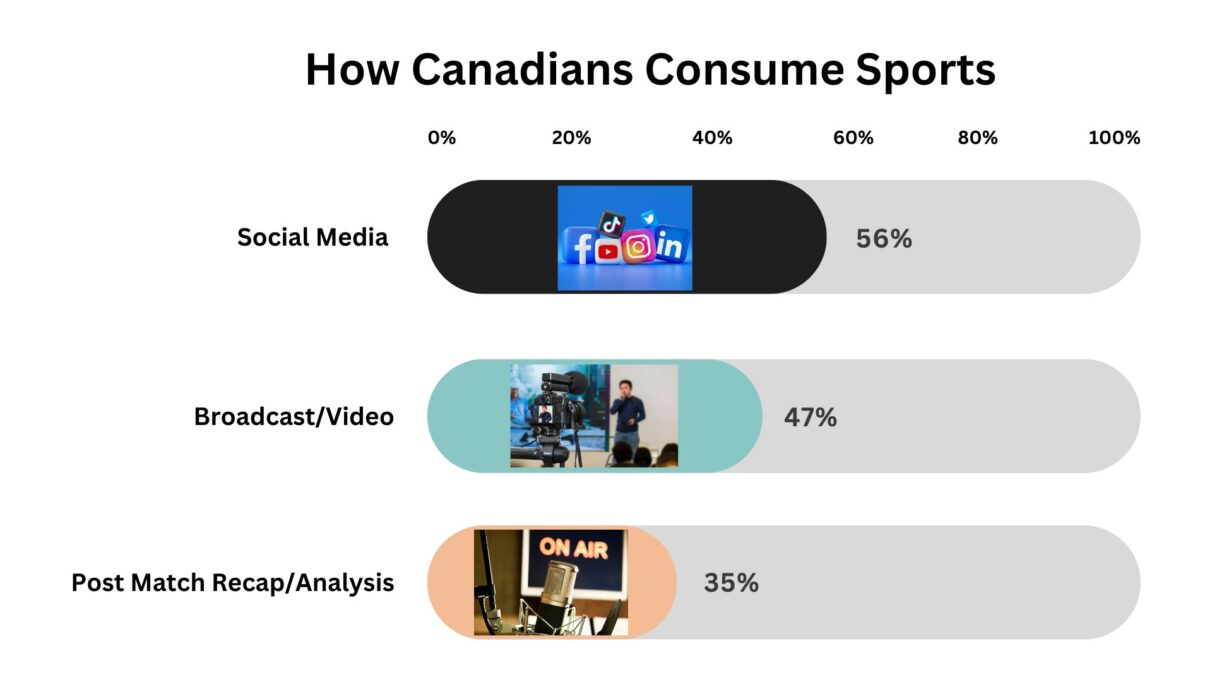
Halifax sports producer Mavs Gillis devotes his career to hyperlocal coverage on Eastlink TV, a cable channel that is seen across Atlantic Canada. Eastlink offers travel and talk shows, along with live high school and community college games.
Gillis talked to The Signal about the challenges of spotlighting local athletes in a crowded marketplace.
“If a sports fan is interested, they’ll get their information from TSN, from Sportsnet, which is really sad because there’s so many good local sports stories,” Gillis said.
“TSN and Sportsnet are not going to be telling those local sports stories.”
Using social media
Sportscaster Chris Meaney ventured from his home in the Maritimes due to lack of work in Nova Scotia.
This led him to Toronto where he was a TV producer and radio host. He says broadcasters must evolve and take advantage of marketing through social media.
“I think we’re starting to see that on the East Coast,” said Meaney.
“And I think it’s just through social media. A lot of people are on their phones these days and don’t have time to watch highlights or maybe even games. I think growing the sport in that way and getting creative with some of these interviews whether it’s through TikTok or Instagram or behind the scenes stuff is the solution.”
The future faces of broadcasting
Dylan Jones is a local producer who worries about how the small pond of sportscasters in Atlantic Canada might affect his job.
Jones says he loves to teach and give opportunities to the next generation of sportscasters and has mentored Robinson and others.
However, Jones worries the small industry in Atlantic Canada threatens his position.
“You’ve got somebody coming out of school who’s been mentored well, and they can do the same job that I can do but for a lot cheaper and that can be a lot nicer for a businessman to realize like, ‘Oh, I can get the same quality but for smaller price,’” he said. “It is a double-edged sword. I love teaching people. But they may steal my job.”
Despite the dearth of Atlantic Canadian sportscasting opportunities, Vince Williams’ message to aspiring sportscasters in the region is simple: “Say yes.”
He encourages them to support community-level stories and fight for local Atlantic coverage to be noticed by large broadcasters.
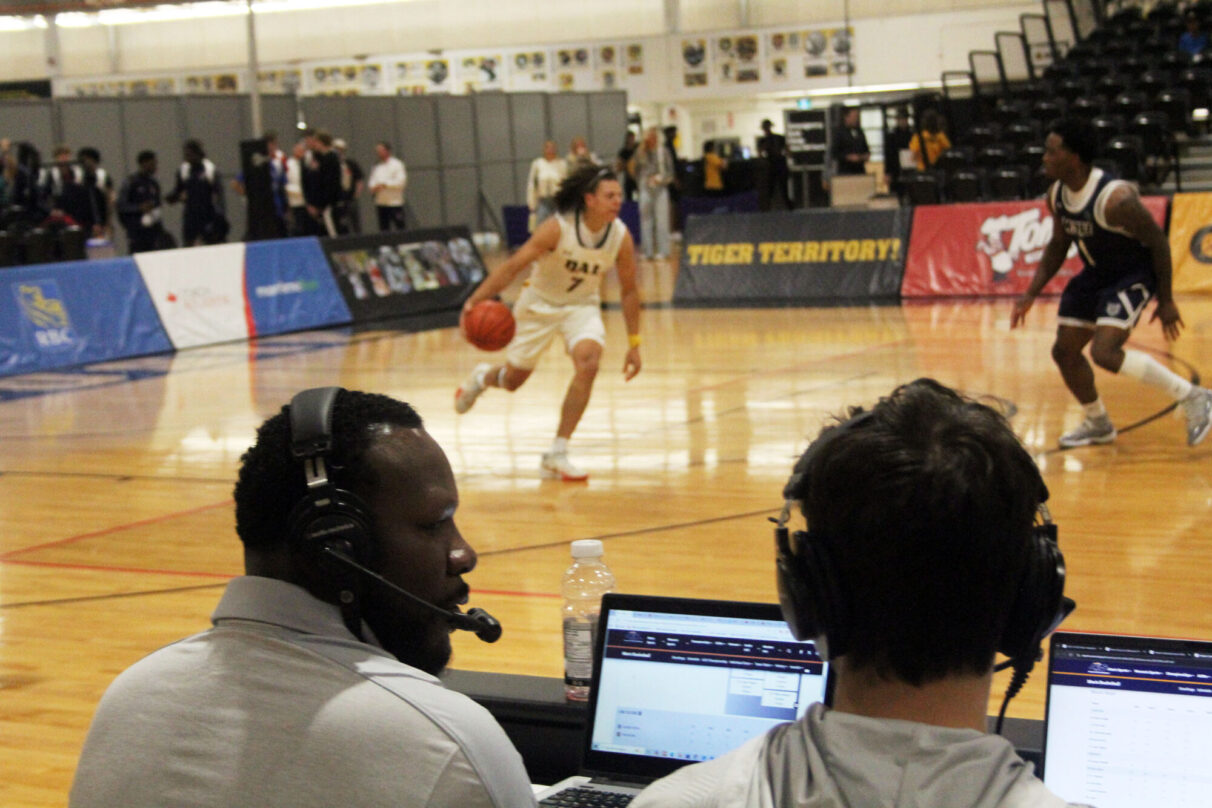
caption
Halifax sportscaster Vince Williams has built up a versatile skillset to stay in the business. He calls basketball as well as hockey, at the professional and amateur levels.“Cut your teeth in every single sport,” Williams said. “Do the work in regard to covering it properly.”
Isabelle Robinson is certain about her future in sports broadcasting, but she knows it might not be in Atlantic Canada.
“I feel like the only way that I would actually debate staying in Nova Scotia for my career would be if we had more big teams and if we had a bigger streaming service than we have right now,” she said.
About the author

Samuel Hodd
Sam is a fourth year journalism student at the University of King's College and Broadcaster for the UKC Blue Devils.
